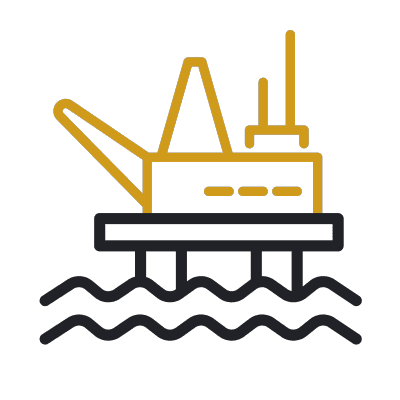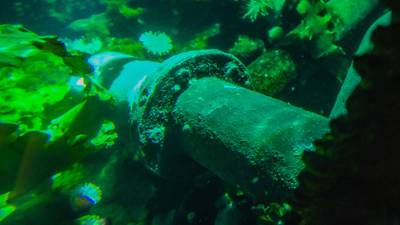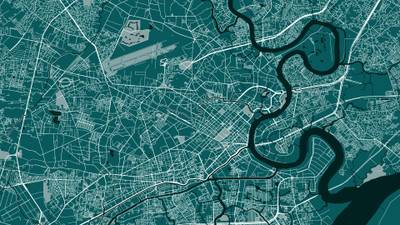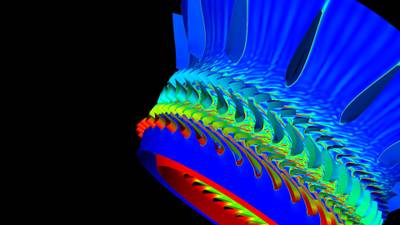Join an online Well Plugging and Abandonment (P&A) course you can study flexibly, online.
Train in this essential part of decommissioning offshore oil and gas infrastructure.
- Study the scientific, engineering, and economic rationale for abandoning wells and decommissioning fields.
- Learn with a university operating at heart of the North Sea oil and gas sector for decades.
- Join a course that fits around full-time work.
You’ll benefit from direct input from industry, helping you enhance and explore your career options as a graduate engineer.

Build credits towards a Masters degree
This online course is part of:
You can use the credits you earn on this short course towards this MSc qualification.
What you’ll study
In this course, you’ll study the technologies and procedures involved in the plugging and abandonment of oil and gas wells prior to decommissioning.
You’ll get an overview of the origins of petroleum, factors influencing the commerciality of fields, and the technical and economic requirements for decommissioning.
You’ll learn about the application and limitations of materials including cement slurries, gelled pills, mechanical plugs, inflatable plugs and sand plugs, focusing on installation procedures, reliability and long-term (decadal) monitoring of well integrity.
Topics you’ll cover
You’ll cover topics including:
- Overview of subsurface, reservoir and petroleum geology
- Characteristics and challenges of depleted reservoirs
- Specific regulations and legislative drivers associated with well abandonment
- Assessment of different types of well plugging and abandonment methods and associated technologies
- Requirements for and cost of well plugging and abandonment
- Material, wellbore knowledge, reliability, and long-term monitoring of well plugs
- Slurry design, plug place methods, procedure and testing
- Well plugging and abandonment project planning and field operation
- Threat, risk and technology challenges
The course also gives you a general overview of reservoir and petroleum geology, with an emphasis on depleted reservoirs and associated challenges for P&A.
You’ll explore key aspects of regulatory and legislative drivers, becoming familiar with P&A regulations set by regional and national governments.
To ensure you’re equipped with a comprehensive knowledge of the P&A process, you’ll also cover project planning and implementation costs, with real-life case studies used to support your learning.
By the end of this course, you’ll understand…
-
The scientific, engineering, and economic rationale for abandoning wells and decommissioning fields.
-
The use and limitations of various tools and technologies to assess the condition and integrity of wells and depleted reservoirs.
-
How geology and reservoir conditions affect well plugging and abandonment decisions.
-
Regulations and legislation associated with well abandonment.
-
Various methods for well plugging and abandonment and their benefits and limitations.
-
The design of slurry, plug place methods, procedure and testing within the context of well plugging.
-
The planning associated with, and cost evaluation of, well plugging and abandonment projects.
-
The threats, risks, environmental impacts, and technological challenges associated with decommissioning.
Choose the University of Aberdeen for online decommissioning courses

Led by industry
Your course content is developed and reviewed by an Industry Advisory Board, so your training is always cutting edge and industry-relevant.

Decommissioning pioneers
Home to the newly launched National Decommissioning Centre, we’re the first university in the world to offer a Masters in Decommissioning.
Visit the Decommissioning Centre website
20% alumni discount
University of Aberdeen alumni get 20% off this online course.
How you’ll study
Online learning
This distance-learning Well Plugging and Abandonment course is delivered flexibly online.
You can learn with us anywhere in the world, no student visa required, and manage your study hours to suit you.
Your teaching
This course is taught at Masters level.
Your teaching is delivered through MyAberdeen, our online Virtual Learning Environment (VLE). It holds all the materials, tools and support you’ll need in your studies. Take a look around MyAberdeen.
You can access your learning materials on computer, smartphone and laptop, 24 hours a day. You’ll find a range of resources available, including:
- case studies
- online lectures
- reading materials
- discussion boards with your tutors and peers
- the online resources of our award-winning Sir Duncan Rice Library.
Industry input
You’ll benefit from direct industry input via an Industry Advisory Board. It constantly reviews your course content, ensuring you gain the latest knowledge and are up to speed with emerging trends, technologies and career opportunities.
You’ll be assessed online. Assessment will take place throughout the teaching term.
Types of assessment for this course may include:
- coursework
- online quizzes
- timed online open-book assessments.
Assessment deadlines
Your assessments will have submission deadlines, either during or at the end of the course. Your course coordinator will let you know when your assessment deadlines are, so you can plan your study time accordingly.
The course totals approximately 150 hours of study and assessment time. That’s around 10 – 15 hours per week.
This is an indicative guide to the time required for a typical student at this level to achieve the learning outcomes. This includes time for independent study, as well as teaching and assessments.
You can largely set your own study hours each week to cover the materials. MyAberdeen is available 24/7, so you can log in and study when it suits you.
Activities at fixed times
There may be some activities scheduled for fixed times. This could include coursework and assessments with deadlines, or online meetings with your tutor. Otherwise, you can access and work through the course at your convenience.
Our first-class support structure will ensure that you aren’t alone in your studies. You’ll have contact with your course coordinator throughout your course. This could be by email, MyAberdeen, online call, or phone. You can use social media and discussion boards to chat with your fellow students too.
We provide a wide range of services to support you in your studies and beyond:
- Careers and Employability Service
- Disability support
- IT support
- Library support
- Student Support Service – help with finances, stress, wellbeing and non-academic issues
- Student Learning Service – study support, with advice sessions available via phone or Skype
- Aberdeen University Students’ Association (AUSA) – run by students for students
- Toolkit – clever apps and free training that can make your study life easier
Wherever you are in the world, you’ll feel part of our very special Aberdeen learning community.
Your course coordinator

Dr Prashant Jadhawar
Prashant, your course coordinator, is a distinguished Lecturer with over 22 years’ combined experience in academia and the oil and gas industry.
His expertise spans enhanced oil and gas recovery, CO2 sequestration, and reservoir modelling. Prashant has contributed significantly to the field, with numerous publications and talks. He’s actively engaged in research on hydrogen innovation, subsurface CO2 sequestration and storage, funded currently by the Net Zero Technology Centre.
Prashant is also active in various committees of the Society of Petroleum Engineers (SPE) Aberdeen Section, alongside collaborating with industry professionals.
View Prashant’s profileWhere this will take you
Towards a Masters
You’ll earn 15 credits at Masters level (SCQF Level 11) with this course. You can use these credits towards our:

Accredited Masters in Decommissioning
Join the world’s first and only accredited online Masters degree in decommissioning oil rigs, platforms and offshore structures.
View MSc DecommissioningBuild your learning
We offer a range of specialist online Engineering and technology courses you can use to build your skills.
Many carry credits you can build up into postgraduate qualifications, including Masters degrees:
Careers
Your employer or professional institute may recognise this course for Continuing Professional Development (CPD). Talk to your employer or institute to find out more.

Free career support
Access our free careers service while you study.
- 1:1 appointments
- CV checks
- Interview prep
- Job opportunities
Entry requirements
Entry requirements
We welcome students from all over the world.
See the minimum entry requirements above. If you do not have qualifications from the UK, check equivalent qualifications from your country.
Visa requirements
You do not need a student visa to study online with us.
English language requirements
Teaching is delivered in English.
If English is not your first language, use our English requirements checklist to see if you need to provide evidence of your English language skills when you apply.
English language tests and scores
If you do need to provide English language test scores, these are the tests and minimum scores we accept for this course or degree.
These are our Postgraduate Standard requirements.
IELTS Academic, IELTS UKVI Academic, and IELTS Online (not IELTS Indicator or IELTS General Training)
- 6.5 overall
- 5.5 for listening, reading and speaking
- 6.0 for writing
TOEFL iBT and TOEFL iBT Home Edition
- 90 overall
- 17 for listening
- 18 for reading
- 20 for speaking
- 21 for writing
- TOEFL DI code is 0818
Cambridge English: B2 First, C1 Advanced, or C2 Proficiency
- 176 overall
- 162 for listening, reading and speaking
- 169 for writing
LanguageCert Academic/LanguageCert Academic SELT
- 70 overall
- 60 for listening, reading and speaking
- 65 for writing
LanguageCert International ESOL B2 Communicator (Written and Spoken) – Online / In-centre
- Overall High Pass
- 33 for listening, reading and speaking
- 38 for writing
Oxford ELLT Digital – English Language Level Test Online
- 7.0 overall
- 5.0 for listening, reading and speaking
- 6.0 for writing
PTE Academic (online test not accepted)
- 62 overall
- 59 for listening, reading, speaking and writing
Duolingo – tests taken from 1 July 2024 onward
- 120 overall
- 95 for listening, reading and speaking
- 105 for writing
University of Aberdeen English Pre-sessional Programme (PSE)
- Pass
- Valid for one year. Refresher can be offered if out of date
Pre-sessional academic English preparation programmes undertaken at other UK universities
- Pass at an equivalent of 6.5 (C1)
- B2 in all four skills
- Certification must be within one year prior to the start of your course
For full information about language requirements, see our English Language Requirements page.
For this course, you’ll apply through our Applicant Portal. It allows you to upload relevant qualifications and documents. Our admissions team will then review these and contact you.
Documents you’ll need to apply for this course
- Degree transcript
- Personal statement
- CV
Apply now
Start with our step-by-step guide. It explains degree transcripts, what to write in your personal statement and how to use the Applicant Portal.
Apply as early as you can. This is so we have time to review your application and get a decision to you. We also want to ensure you have time to enrol before teaching starts.
September 2024 intake
For our September 2024 intake, the application deadline is 8 September 2024.
You will need to accept your offer and provide any outstanding documents to meet the conditions of your offer by 15 September 2024.
Teaching starts on 23 September 2024.
You will need access to:
A computer (PC, laptop or Mac) operating on either:
- Windows 10 or later
- macOS 10.15 (Catalina) or later.
Most teaching materials are smartphone- and tablet-friendly. But we recommend a proper laptop or desktop for completing assignments comfortably.
Reliable internet access
We recommend:
- a wired connection
- a minimum download speed of 2 Mbps so you can take part fully in live sessions.
Speakers or headphones
- We recommend a headset with built-in microphone and earphones if you’re likely to study in an environment with background noise.
- A webcam is optional, but you may like to use one for some interactive sessions.
Software
We’ll give you access to Office365 applications. This means you can use online versions of Microsoft Word, Excel, and PowerPoint and install these programs on up to five personal devices.
If your course requires specialist software, we’ll provide you with access to this and a licence that lasts throughout your studies.
See our detailed IT requirements for more information.
When you study with us, you can expect a first-class support structure so that you’re never alone in your studies.
But learning online does mean you have to motivate yourself and manage your own time.
Your most important commitment will be time – the time to work through, reflect on and understand your teaching materials.
Before you start a course that involves a high degree of independent study, we recommend looking at the time you will be able to devote to your studies each week:
- Be realistic
- Create a weekly schedule as a guide
If you have any questions about studying online, get in touch with our friendly team. We’re here to help.
Fee payment
Your course fee needs to be paid in full before you start your course.
We accept payment via Visa Debit, Visa Credit and Mastercard.
Ways to save
You may be able to get help funding this course via:
- discounts – if any discounts are available for this course, they’ll appear in the section below
- employer sponsorship – we accept full and partial fee payments from sponsors.
Find out more about funding options.
Student card
All our students are entitled to a University of Aberdeen student card. This gives you access to a range of student discounts around the city and online.
For entry to this course, we’d expect you to hold a relevant degree.
However, your application will also be considered if you have alternative qualifications combined with an appropriate level of relevant experience.
Apply for this course


















































